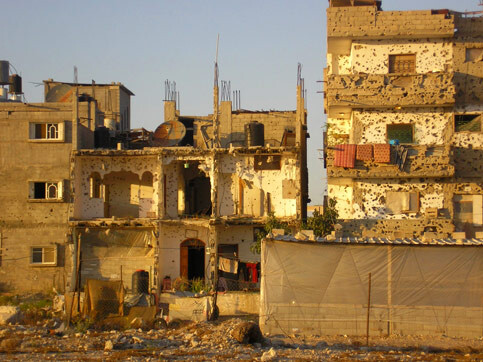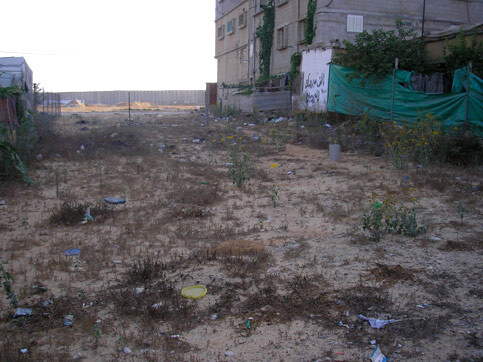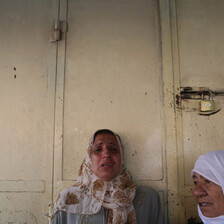Rafah, Gaza Strip 23 July 2007

Located in the southern Gaza Strip, the town of Rafah has been devastated over recent years by Israel’s occupation. (Yassmin Moor)
I first learned of my grandparents’ home being demolished a few months after it actually happened in October 2003. Rafah was besieged by the Israeli army at that time and phone calls to Gaza were nearly impossible. Al-Brazil housing project was hit especially hard because it was alongside the Gaza-Egypt border. I remember I was driving to school in Pennsylvania when my mother called to tell me. She was very calm, and reported it to me like she reported every other piece of news that came out of Gaza. I could not comprehend what she was saying. The shock did not allow me to make sense of anything she was telling me. It didn’t make sense that the house my grandfather built was no longer a house but just rubble. And when I asked her how she felt, she replied like she did with everything else: “We’re no different than the other Palestinians.” My grandfather died in that same house a year before it was destroyed. Since that time my uncle and his 10 family members had been living there.
Now, almost two months of being in Rafah, I worked up the courage to go visit the al-Brazil housing project to pay respect to my grandparents’ demolished home. It was time to come to terms with the reality of the situation. I think it was also important for me to see where the house I spent so many summers used to stand — perhaps to understand why it was demolished in the first place, or to make sense of yet another one of Israel’s unjust and inhumane acts.
I took my cousin with me because I didn’t think I would be able to find it on my own. The entire area by the border and around the house was demolished in October 2003. I read in the news, and my uncle confirmed, that Israel destroyed all the homes because they apparently were looking for the tunnels between Rafah and Egypt that they said were used for smuggling weapons. Basically, Israel was ostensibly doing its job in what it has always claimed as, “dismantling the terrorist infrastructure. “

The land where the author’s grandparents’ house once stood. (Yassmin Moor)
After walking around in what felt like circles around the flat land looking for the remnants of the house, we found it. There right in front of me sat a small piece of land with a few strings of grass growing on it. The house my mother grew up in no longer stood there. And there I stood staring at the land, wondering how or what could have wiped away an entire house from the ground up. Also missing was the garden my grandmother grew and the fig and olive trees. And what about the small shop my grandfather had inside the house he built to keep himself busy? Or the gate that I hated for the many times it shut on my fingers? Or the backyard where my mother had her wedding? Where was the room in which I saw my grandmother for the last time before she died — also gone? I felt lost; I couldn’t make out exactly where I used to sleep during the summer, or where the steps that I played on used to be. It was all gone, and all that was left of it was flat land growing a few strings of green grass. “Are you sure this is it? Are you sure — maybe there were still some parts left to it,” I asked my cousin. “Yes, of course,” he replied. There wasn’t any way to come to terms with what I was looking at. It was hard for the land to mean anything to me. I had no relation to it.
It was nothing to me if it did not have my grandparents’ house — just land alongside the border of Rafah. Without the walls, or the rooms, or the gardens, it meant nothing to me. All my rationale was suddenly gone, and I felt like a child again wondering and in denial if I would ever see my grandparents’ house again.
We continued to walk alongside the wall over empty land and I imagined the houses that stood under my feet as I walked over it. I wondered whose homes I was stepping on, whose memories I was walking over, and whose lives were shattered during the demolition. I imagined as my cousin described where the tanks stood just two years ago and shot 10 children dead, and where Israeli snipers hid in a hole — still there — that they dug in the rubble. I imagined the shelling of the houses, and to which people must have run with their children. But I didn’t recognize any part of al-Brazil, for it wasn’t houses I was looking at, only empty, flat land. The school in which my parents met and fell in love was gone, and I stood face to face with the wall, in the same spot I used to stand over 10 years ago, but it was barbed wire then — the same barbed wire that my grandfather stood behind to speak with his son in Egypt. All of Gaza used to be surrounded by barbed wire, but it is now a wall that imprisons them. Palestinians in Egypt who are not allowed in Palestine can no longer meet us at the wall, and if my grandfather were alive, he wouldn’t be able to see or speak to his son through this 25-foot-tall wall like he used to.
I cried at what was left. I had nothing left to imagine, nothing but memories of my grandparents’ home. The house ceased to exist and there was no way to get it back. I am left along with many other Palestinians to try to come to terms with the reality of our situation — which we are supposed to accept unquestioningly as life goes on regardless.
Yassmin Moor is a Palestinian-American writing from Rafah, Gaza. She is currently working to implement a gardening project through an organization she co-founded, Save Gaza. Yassmin can be reached at yasminemoor A T gmail D O T com.


